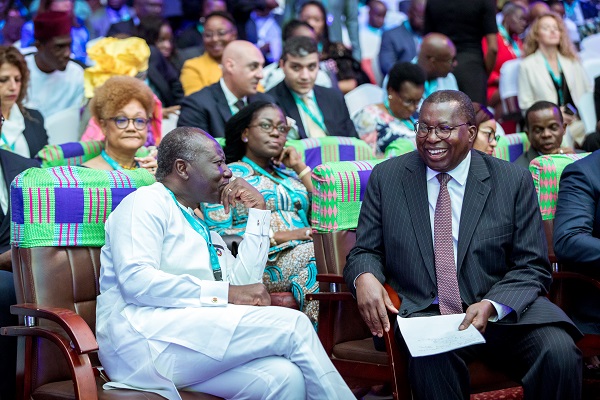The 30th annual general meetings of the African Export-Import Bank (Afreximbank) opened in Accra on Sunday (18 June) with speakers highlighting the need for Africa to boost intra-African trade and integration in the face of the challenges resulting from the impact of the global COVID-19 pandemic and the adverse economic challenges due to the Ukraine crisis and other global conflicts.
The Afreximbank annual meetings (AAM2023), which end on 21 June, is also being held to celebrate the 30th anniversary of the establishment of Afreximbank.
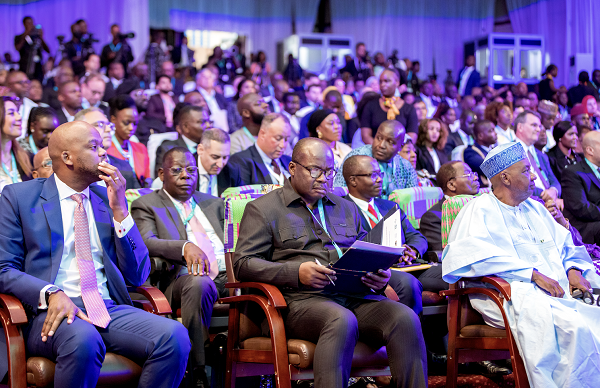
Mohamed Ahmed Maait, Minister of Finance of Egypt and chairman of the AAM2023, who was represented by Gamal Negm, deputy governor of the Central Bank of Egypt, told participants that Africans must work collaboratively towards finding integrated solutions to the new challenges confronting the continent.
Maait lauded Afreximbank for playing a significant role in developing and implementing solutions to address the challenges confronting Africa and expressed the hope that AAM2023 would lead to even more constructive solutions to Africa’s problems, describing the bank as one of the African institutions delivering on the African Union’s (AU) Vision 2063.
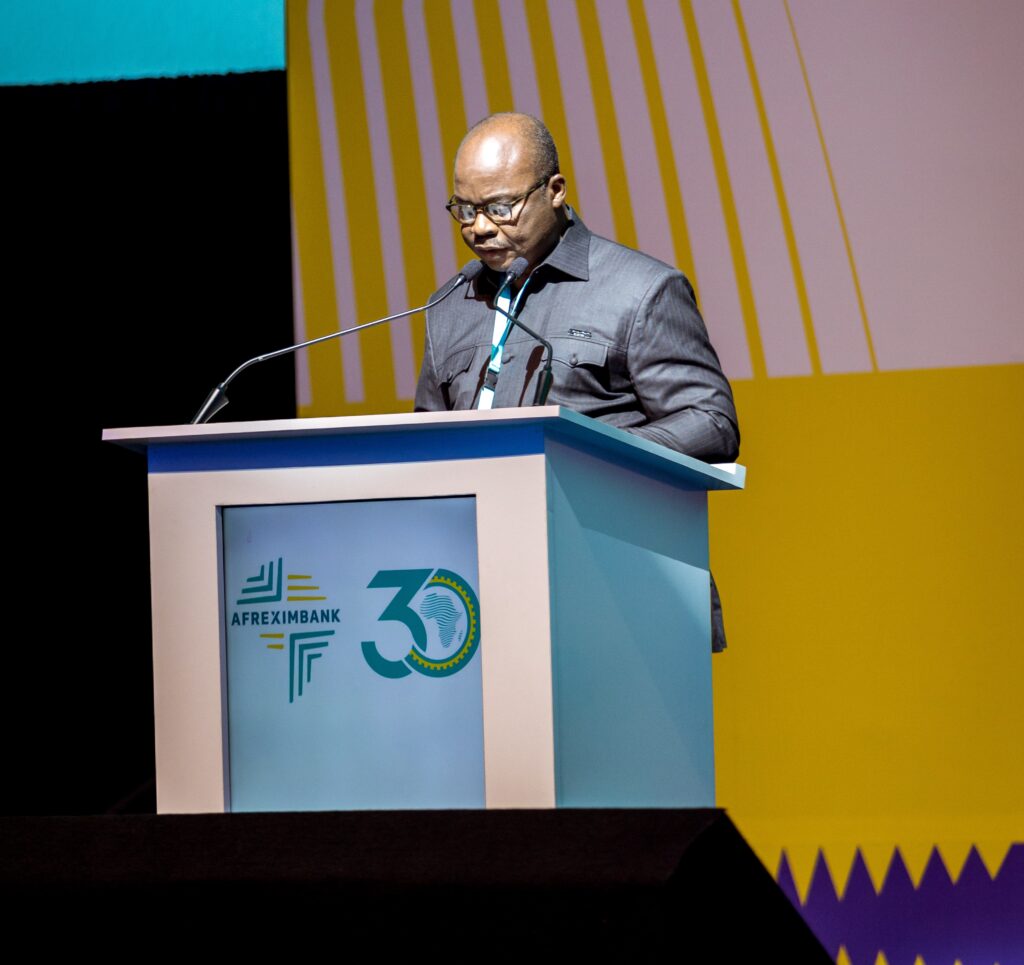
For his part, the Governor of Bank of Ghana, Ernest Addison, said that Ghana represented the most appropriate venue for the celebration of Afreximbank’s 30th anniversary, given the bank’s role in developing and promoting African trade and the fact that Ghana was the home of the African Continental Free Trade Area (AfCFTA) Secretariat.
Addison said that Afreximbank had been very supportive of Ghana and had, over the years, provided more than US$2 billion to support the Ghanaian economy.
He commended Afreximbank for the approach it adopted in its work which emphasised a collaborative method in dealing with other continental institutions.
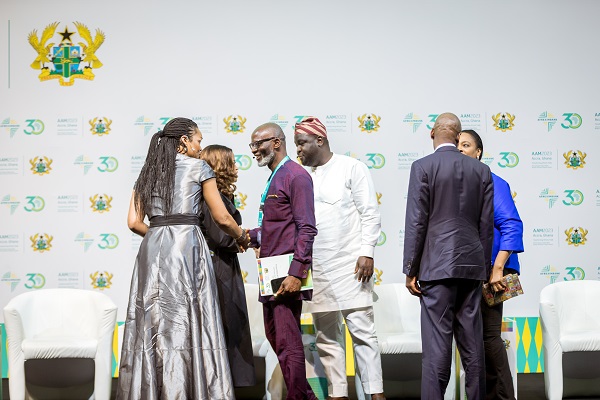
In his contribution, Wamkele Mene, the Secretary-General of the AfCFTA Secretariat, said that with the inclusion of a vision for an integrated African market in the founding treaty of the OAU, the founding fathers of the AU had foreseen the need for Afreximbank.
That vision had been grounded in the objective of the integration of African trade finance, he noted.
Describing Afreximbank and the AfCFTA as twins born 30 years apart, Mene noted that if trade barriers were eliminated but there was no trade finance, all the efforts would come to nothing. At the same time, if trade finance was available but trade barriers persisted and prevented trade, then all the efforts would still have been wasted.
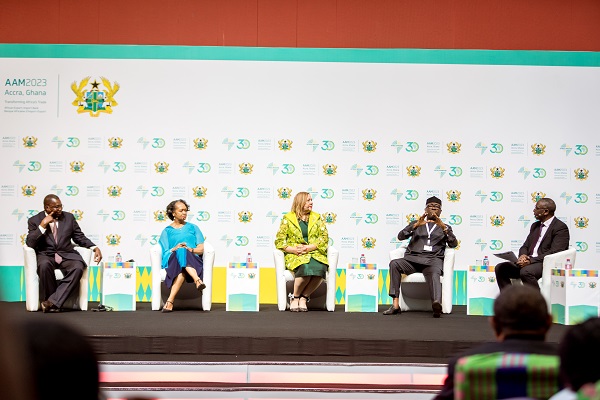
Mene commended the support and collaboration, which Afreximbank had provided for the implementation of the AfCFTA, including the introduction of the AfCFTA Adjustment Fund and the establishment of the Pan-African Payment and settlement System (PAPPS). That support was critical as Africa sought to rely on itself to create a better future, he added,
Mahamadou Issoufou, former president of Niger, said that with Africa accounting for a significant proportion of the world’s arable land, it was time for the continent to be able to feed itself, noting that a focus on agriculture and agro-industrtialisation would also lead to creation of employment.
Issoufou commended Afreximbank for its support for the AfCFTA project, which had included supplying indispensable personnel, in addition to making investments, such as the AfCFTA Adjustment Fund to help countries adapt to the AfCFTA and improve their ability to compete in the new trade regime for which the bank had already provided US$1 billion.
Afreximbank had also launched PAPSS in order to allow for intra-African trade payments to be done in local currencies, he noted. It had also introduced the Intra-African Trade Fair (IATF), a platform for exchange which Africa needed in order to meet the needs of the AfCFTA.
The day also featured panel sessions on: Turbo-charging implementation of the AfCFTA; Building prosperity for Africans: the challenges of peace and security; and What would it take for Africa to feed itself – overcoming the challenges of food security for sustainable development in Africa; as well as a conversation with Aliko Dangote, Group President/Chief Executive of Dangote Group.
About Afreximbank
Afreximbank is a Pan-African multilateral financial institution mandated to finance and promote intra-and extra-African trade. For 30 years, the bank has been deploying innovative structures to deliver financing solutions that support the transformation of the structure of Africa’s trade, accelerating industrialization and intra-regional trade, thereby boosting economic expansion in Africa.
A stalwart supporter of the African Continental Free Trade Agreement (AfCFTA), Afreximbank has launched a Pan-African Payment and Settlement System (PAPSS) that was adopted by the African Union (AU) as the payment and settlement platform to underpin the implementation of the AfCFTA. Working with the AfCFTA Secretariat and the AU, the Bank is setting up a US$10 billion Adjustment Fund to support countries to effectively participate in the AfCFTA.
At the end of 2022, Afreximbank’s total assets and guarantees stood at over US$31 billion, and its shareholder funds amounted to US$5.2 billion. The bank disbursed more than US$86 billion between 2016 and 2022. Afreximbank has investment grade ratings assigned by GCR (international scale) (A), Moody’s (Baa1), Japan Credit Rating Agency (JCR) (A-) and Fitch (BBB). Afreximbank has evolved into a group entity comprising the Bank, its impact fund subsidiary called the Fund for Export Development Africa (FEDA), and its insurance management subsidiary, AfrexInsure.
Source: Daily Mail GH

